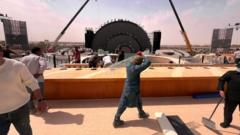Reports highlight urgent need for improved safety measures in light of upcoming global sporting event.
Surge in Deaths of Migrant Workers in Saudi Arabia Ahead of 2034 World Cup

Surge in Deaths of Migrant Workers in Saudi Arabia Ahead of 2034 World Cup
Human rights organizations sound alarms as preventable migrant worker fatalities rise in the Kingdom.
Human rights advocates have raised serious concerns about a concerning rise in fatalities among migrant construction workers in Saudi Arabia, particularly as the country gears up to host the World Cup in 2034. Reports from Human Rights Watch and FairSquare published today emphasize that many deaths, often stemming from preventable job-related accidents, are inaccurately recorded as natural causes, leaving bereaved families without compensation.
"Preparations for the 2034 World Cup will see an unprecedented workforce of migrant laborers engaged in constructing infrastructure, including 11 new stadiums, a comprehensive rail system, and 185,000 hotel rooms. However, this could come at an alarming human toll," cautioned Minky Worden, Director of Global Initiatives at Human Rights Watch.
This alert follows a recent visit by FIFA President Gianni Infantino and former US President Donald Trump to Saudi Arabia for an investment forum, raising further scrutiny of FIFA's commitment to human rights. As the governing body of football, FIFA has publicly recognized the significance of human rights but has faced criticism for inadequately addressing past migrant worker fatalities linked to the 2022 World Cup in Qatar.
In a nation with limited transparency regarding migrant deaths and where labor unions are prohibited, acquiring data poses a significant challenge. Nevertheless, interviews conducted by Human Rights Watch reveal harrowing accounts of severe accidents involving workers from Bangladesh, India, and Nepal, who have suffered fatal incidents like falls from heights, being crushed by heavy machinery, and electrocution.
Inadequate safety protocols and the oppressive working environment are issues exacerbated by the extreme heat, especially as construction intensifies in anticipation of the tournament. The plight of these workers is stark; the death of Pakistani foreman Muhammad Arshad, who fell from a construction site in Al Khobar, has been cited as the first work-related fatality associated with the World Cup preparations.
While the Saudi government touts progress in occupational health and safety and reduces injury rates, critics from the global construction workers' union, BWI, cite a troubling increase in preventable accidents. The union's General Secretary, Ambet Yuson, attributed these trends to ongoing systemic issues like negligence and corruption.
As many young men enter a perilous labor system with limited medical resources to diagnose or investigate their deaths, FairSquare co-director James Lynch condemned the state's apparent indifference towards these workers' welfare. "Many families are left in turmoil, unaware of how or why their loved ones perished while seeking a livelihood," Lynch stated.
In response to these grave concerns, FIFA has announced plans to implement a worker welfare system to establish mandatory standards for safety and enforce accountability among construction companies involved in World Cup-related projects. However, Human Rights Watch questions the adequacy of these measures, noting a lack of clarity on the welfare system's operational aspects.
Human Rights Watch urged Saudi authorities, FIFA, and employers to conduct thorough investigations into all migrant worker fatalities and to treat affected families with dignity and provide timely compensation. The BBC has reached out to Saudi government officials for comment on these crucial matters.
"Preparations for the 2034 World Cup will see an unprecedented workforce of migrant laborers engaged in constructing infrastructure, including 11 new stadiums, a comprehensive rail system, and 185,000 hotel rooms. However, this could come at an alarming human toll," cautioned Minky Worden, Director of Global Initiatives at Human Rights Watch.
This alert follows a recent visit by FIFA President Gianni Infantino and former US President Donald Trump to Saudi Arabia for an investment forum, raising further scrutiny of FIFA's commitment to human rights. As the governing body of football, FIFA has publicly recognized the significance of human rights but has faced criticism for inadequately addressing past migrant worker fatalities linked to the 2022 World Cup in Qatar.
In a nation with limited transparency regarding migrant deaths and where labor unions are prohibited, acquiring data poses a significant challenge. Nevertheless, interviews conducted by Human Rights Watch reveal harrowing accounts of severe accidents involving workers from Bangladesh, India, and Nepal, who have suffered fatal incidents like falls from heights, being crushed by heavy machinery, and electrocution.
Inadequate safety protocols and the oppressive working environment are issues exacerbated by the extreme heat, especially as construction intensifies in anticipation of the tournament. The plight of these workers is stark; the death of Pakistani foreman Muhammad Arshad, who fell from a construction site in Al Khobar, has been cited as the first work-related fatality associated with the World Cup preparations.
While the Saudi government touts progress in occupational health and safety and reduces injury rates, critics from the global construction workers' union, BWI, cite a troubling increase in preventable accidents. The union's General Secretary, Ambet Yuson, attributed these trends to ongoing systemic issues like negligence and corruption.
As many young men enter a perilous labor system with limited medical resources to diagnose or investigate their deaths, FairSquare co-director James Lynch condemned the state's apparent indifference towards these workers' welfare. "Many families are left in turmoil, unaware of how or why their loved ones perished while seeking a livelihood," Lynch stated.
In response to these grave concerns, FIFA has announced plans to implement a worker welfare system to establish mandatory standards for safety and enforce accountability among construction companies involved in World Cup-related projects. However, Human Rights Watch questions the adequacy of these measures, noting a lack of clarity on the welfare system's operational aspects.
Human Rights Watch urged Saudi authorities, FIFA, and employers to conduct thorough investigations into all migrant worker fatalities and to treat affected families with dignity and provide timely compensation. The BBC has reached out to Saudi government officials for comment on these crucial matters.



















